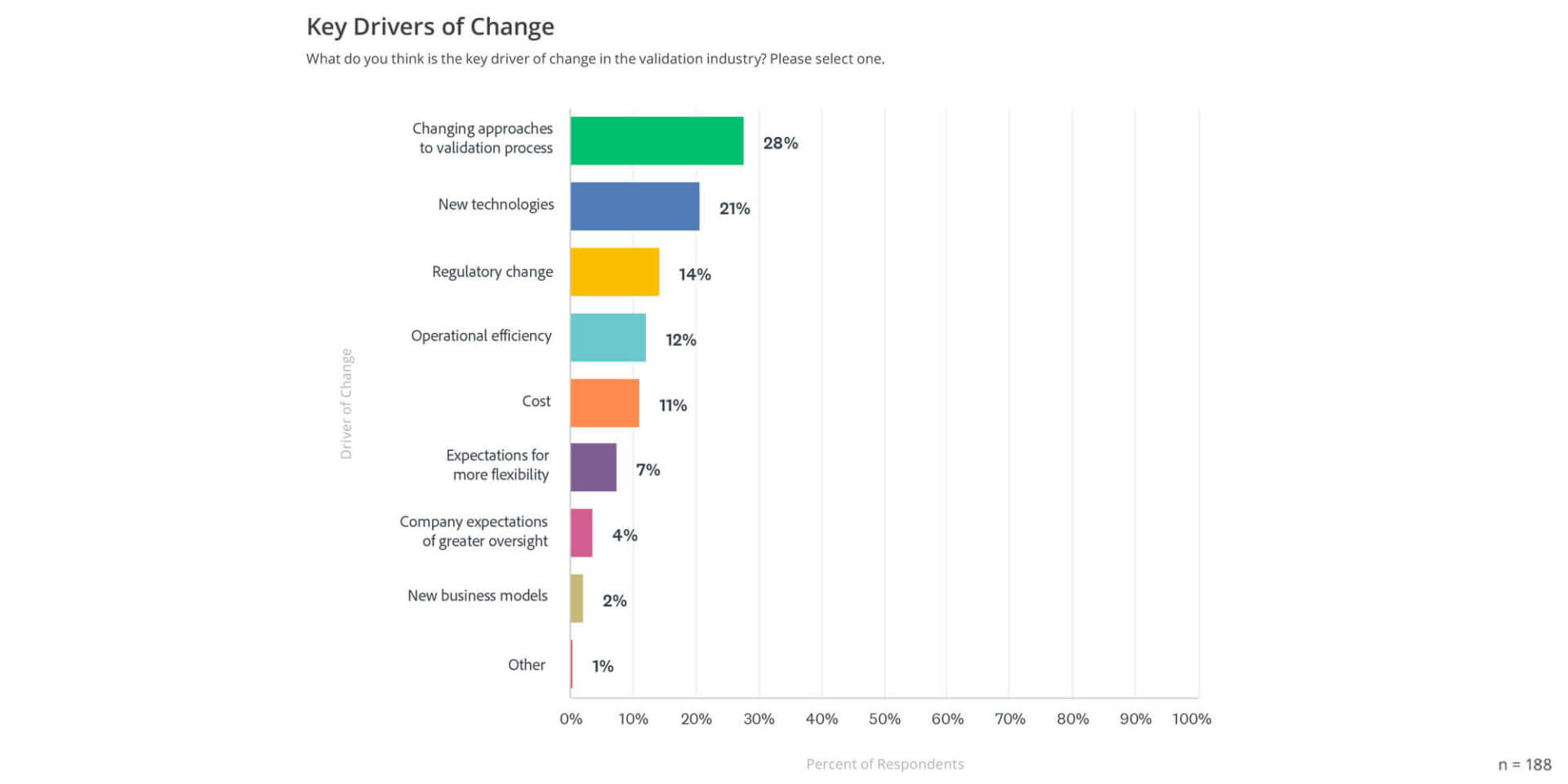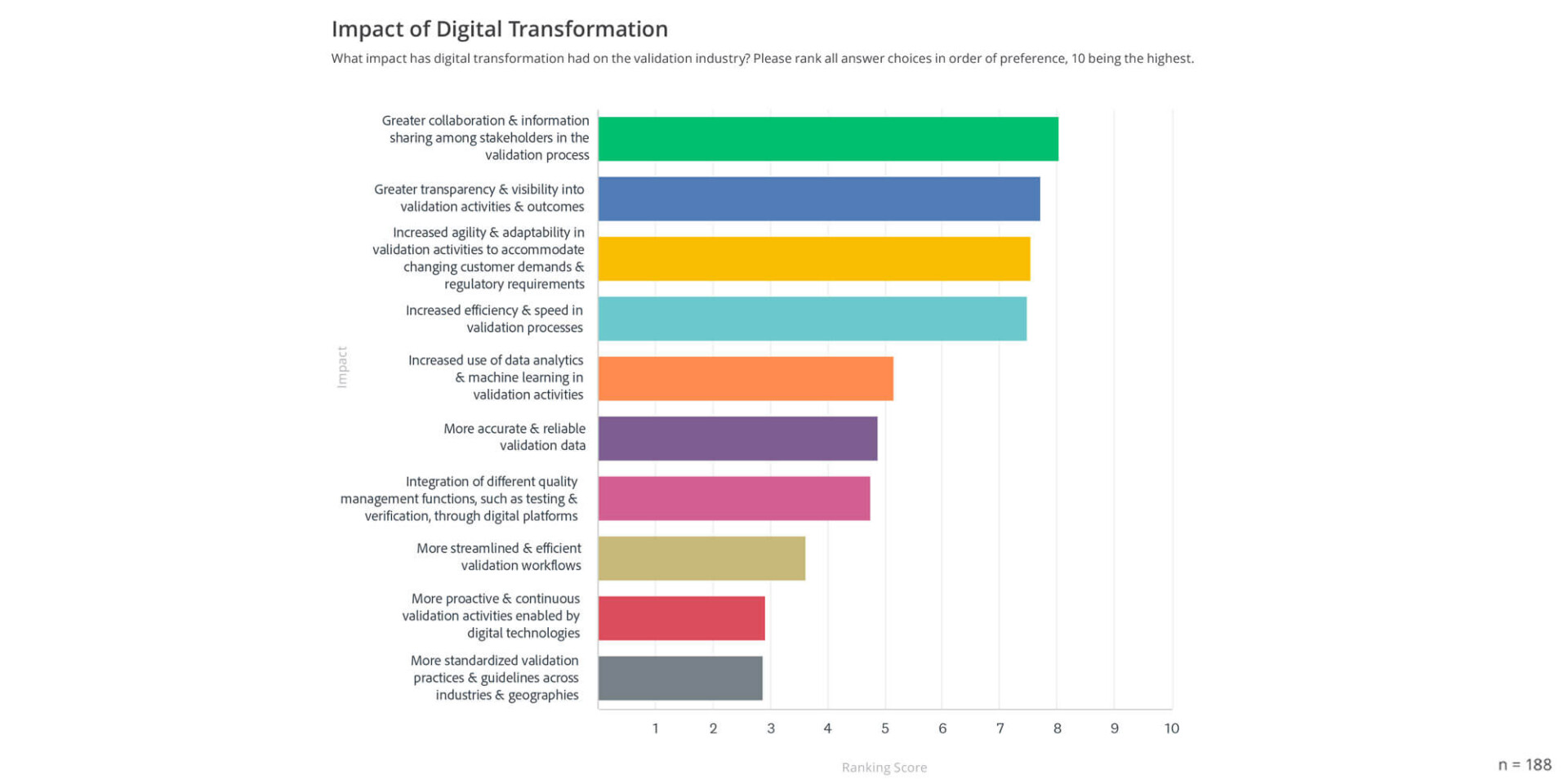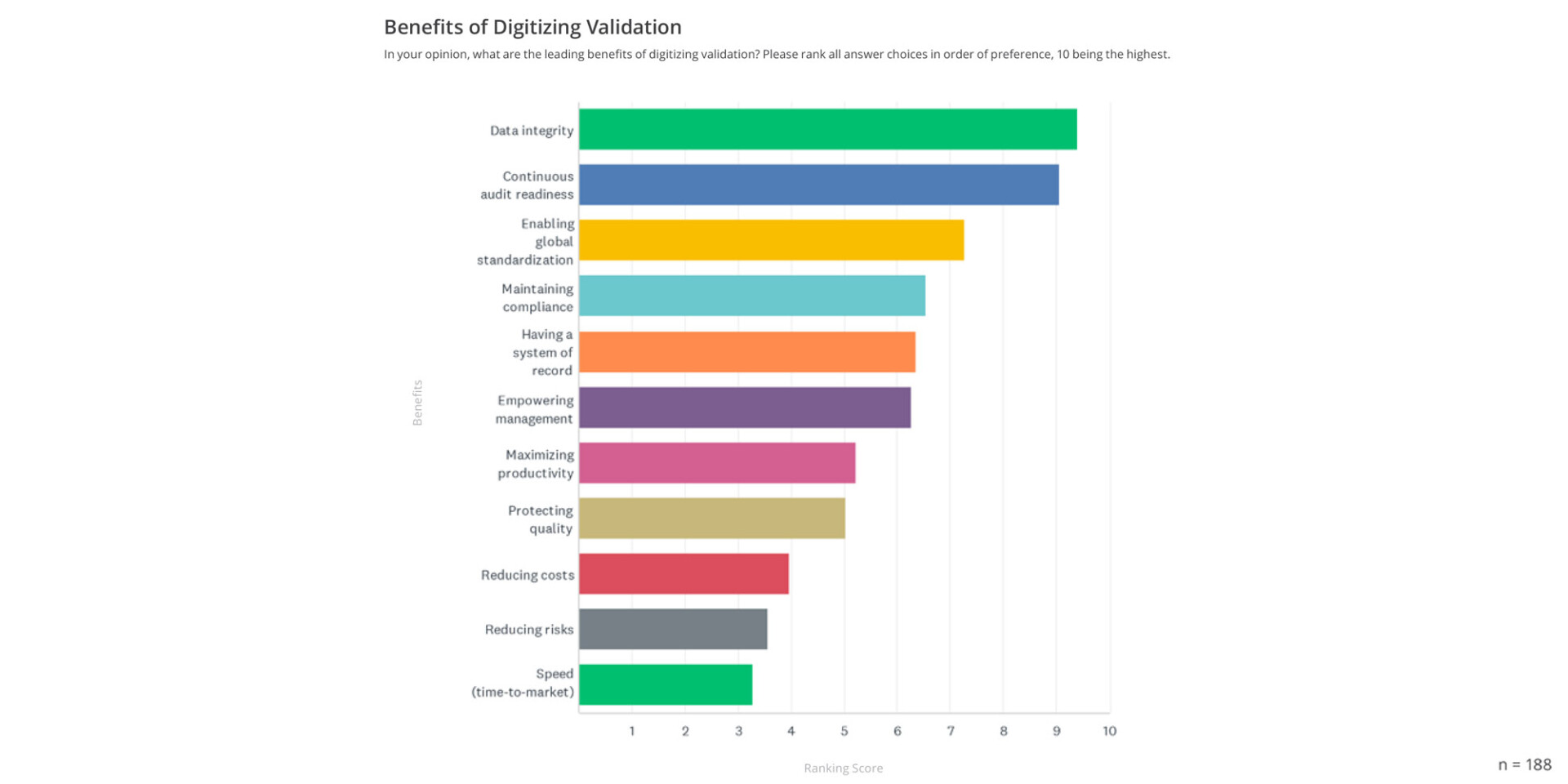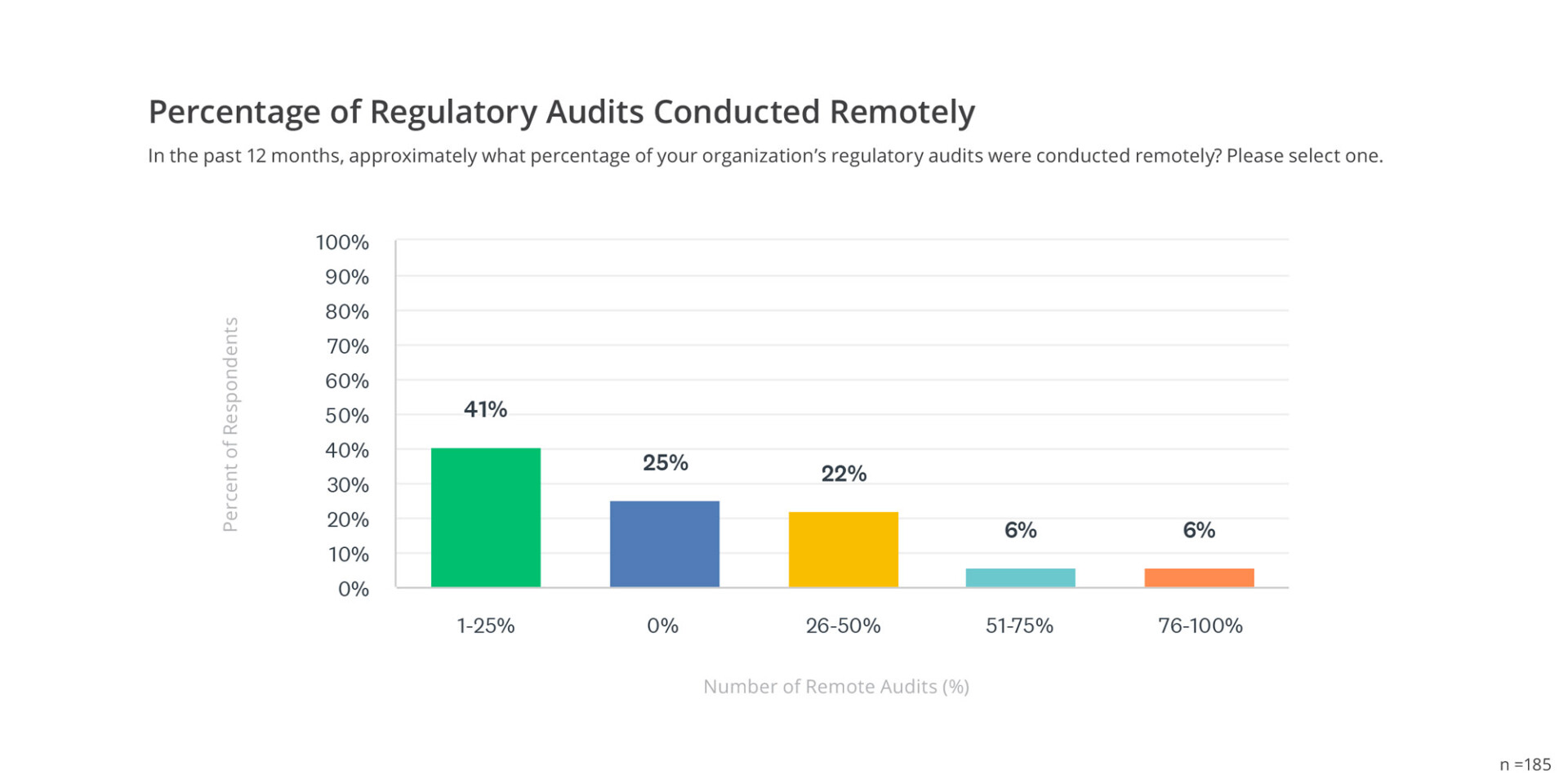The 2024 State of Validation report outlines the ongoing transformation within the validation sector, primarily driven by digital innovations and changing regulatory frameworks. As businesses adopt new technologies, this evolution presents both challenges and opportunities for professionals in the validation space.
In this article, we highlight key insights from Section 4 of the report, Industry Change and Digital Transformation, which delves into the pivotal forces reshaping the validation landscape today.
Key Drivers of Change
One of the most impactful findings from the 2024 report is the identification of the primary drivers reshaping the validation industry (see graph below).

Three standout factors include:
- Changing Approaches to Validation (28% of respondents): As the landscape becomes more complex, there’s a noticeable shift towards refining and optimizing the validation process itself. This has emerged as the top driver of change, emphasizing the need for professionals to stay abreast of evolving methodologies and best practices.
- New Technologies (21%): Digital tools are revolutionizing how validation is performed, offering significant potential for improving both accuracy and efficiency.
- Regulatory Changes (14%): The regulatory environment is constantly evolving, necessitating organizations to remain agile in their processes and compliance efforts.
Impact of Digital Transformation
Survey results underscore a sizeable shift towards digital validation in the industry. An overwhelming 83% of respondents are embracing digital validation, split between 30% who have already implemented digital validation systems and 53% who are planning to.
Among those using digital validation, a substantial majority (79%) of validation professionals rely on third-party software providers for digital validation solutions. This highlights the industry’s preference for specialized, externally developed tools, likely due to their advanced features and support.
As digital transformation takes hold across the validation sector, its impact is both wide-ranging and profound. The report identifies several key benefits of this shift (see graph below).

- Greater Collaboration and Information Sharing: Ranked as the most significant impact, digital tools have fostered improved collaboration among stakeholders, enabling more efficient and real-time exchange of information. This is particularly important in an industry where coordination across departments and geographies is critical to maintaining compliance and operational standards.
- Increased Transparency and Visibility: Digital platforms have enhanced transparency, providing organizations with a clearer view of their validation processes. This visibility helps ensure that validation activities meet the required standards and makes auditing and compliance easier to manage.
- Enhanced Agility and Adaptability: As customer demands and regulatory requirements evolve, digital tools allow validation teams to respond more swiftly and effectively. This flexibility is essential in maintaining competitiveness and staying ahead of compliance obligations.
Benefits and ROI of Digital Validation Systems
The benefits of digital validation systems, ranked by survey respondents, are listed in the graph below.

- Improved Data Integrity: Ranked as the top benefit of digitizing validation, data integrity remains critical to ensuring compliance and trust in validation activities.
- Continuous Audit Readiness: Digital tools ensure organizations are always prepared for audits by providing real-time access to documentation and records, minimizing the time and effort required for audit preparation.
- Enabling Global Standardization: By aligning processes across geographies and business units, digital tools help organizations adhere to global regulatory standards, ensuring consistency and reducing the risk of non-compliance.
Voice of the Industry
What benefits have you realized from digitized validation, and has it met your expectations?Digital Compliance Manager, Multinational Information Technology Services & Consulting Company, France
Digitalization has significantly accelerated validation processes, reduced documentation requirements, enhanced collaboration, and enabled the adoption of new technologies. It also allows reliance on external experts who possess specialized knowledge beyond internal capabilities
The report also notes that 63% of organizations using digital validation systems reported a stated return on investment (ROI) that met or exceeded initial expectations. This underscores the value of these systems in driving efficiency, compliance, and reducing validation costs.
Biggest Challenges Managing the Implementation Project for Digital Validation Systems
While the benefits of digital transformation are evident, organizations face challenges in adopting these new tools. The top challenge identified in the report is overcoming resistance to change (selected by 44% of respondents), indicating cultural and behavioral adjustments are major hurdles. Ensuring adoption from users follows closely at 40% emphasizing the need for user engagement and training.
Embracing Remote Audits
Another key development highlighted in the report is the growing trend of remote regulatory audits. In 2024, a substantial portion of respondents (75%) conducted at least some of their audits remotely in the past 12 months (see graph below).

This shift toward remote auditing reflects the increasing reliance on digital technologies to support remote work and monitoring.
Final Thoughts
The 2024 State of Validation report paints a clear picture of an industry in transition. As validation processes become increasingly digitized, the benefits are evident: greater collaboration, improved transparency, and enhanced efficiency. However, organizations must also navigate the challenges of adoption, including resistance to change and the need for continuous learning and upskilling to ensure and enhance adoption rates.
In a rapidly evolving regulatory and technological landscape, those that embrace digital transformation will be best positioned to achieve operational excellence and sustain their competitive edge in the validation industry.
Dive Deeper into the Data: Download the 2024 State of Validation Report
For a deeper dive into these insights and to explore more data on the latest trends, challenges, and opportunities in validation, download the full 2024 State of Validation Report.
Stay ahead of industry changes, understand how digital transformation is shaping the future, and equip your organization with the knowledge to drive innovation and compliance.






